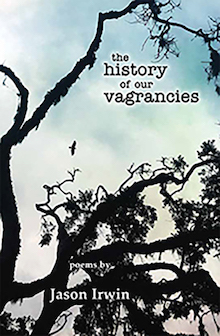 Jason Irwin’s new collection hits me where I live. He is facing middle age and the loss of his parents as I am, so that’s no surprise. This is one of the reasons that I love to read contemporary poetry. It makes me feel less alone in a world that often feels chaotic, but in no way do I feel that his poetry fan base should be limited to fifty year-old men. His poetry explores the essential emptiness that everyone feels at least sometimes, that feeling of being disconnected from the rest of the world in a place that does not match our expectation of what life is or should be, and that we inevitably will lose the people we love.
Jason Irwin’s new collection hits me where I live. He is facing middle age and the loss of his parents as I am, so that’s no surprise. This is one of the reasons that I love to read contemporary poetry. It makes me feel less alone in a world that often feels chaotic, but in no way do I feel that his poetry fan base should be limited to fifty year-old men. His poetry explores the essential emptiness that everyone feels at least sometimes, that feeling of being disconnected from the rest of the world in a place that does not match our expectation of what life is or should be, and that we inevitably will lose the people we love.
If that seems hopeless, it’s not. He is not. He is, however, exploring some of the most painful parts of existence, and it is a comfort to be reminded that I am not alone in these emotions. In “Things We Don’t Like to Talk about,” he anticipates the death of his mother and acknowledges his denial of it:
We both know I’m a coward,
and that facing your death is in a way, facing my own.
I don’t want to hear it.
. . .
I don’t want to be reminded that you’ve donated your body
to science, that there’ll be a day
when you won’t pick up the phone anymore,
and I’ll be left with that silence (35).
This is the denial of death that we all engage in. There is a degree to which this is a healthy approach of course. What would be unhealthy would be mourning people before they are gone or mourning our lives while we’re still here. Still, this is the pain that lies so often at the center of who we are.
Many of the poems deal also with the pain of being a person with a disability. He follows this pain from childhood when he enters kindergarten with “My four-toed club foot” (15). This disability forces him into physical pain and an outsider status. I think the poem that for me was most powerful was “Phantom Limb,” which is about the pain of his disability and the loss of people he loves. It ends with the following lines:
On the bus I feel something cold and slimy
slither across the place my left foot once occupied.
I shift in my seat, and scratch at the empty air (34).
These injuries are real and painful, and there simply is no remedy for them beyond allowing himself to feel as he is going to feel.
The History of Our Vagrancies is a powerful and important collection, and Jason Irwin is an exceptional poet. I am going to work my way through the rest of his collections now, and I suggest that you do as well.
